'Not allowing people to speak or listen is the biggest act of anti-nationalism,' says Arvind Krishna Mehrotra, one of India's finest poets.
Archana Masih/Rediff.com met the poet who is rock-star cool and brutally honest as his writing.
Beginning an occasional series highlighting the nation's original minds.
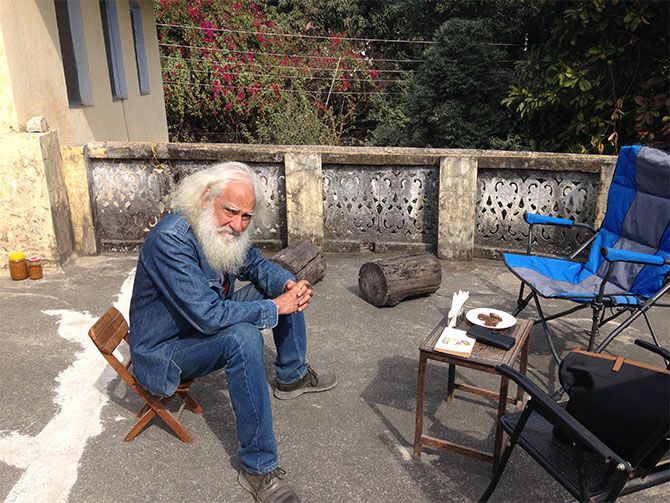
"Shall we sit in the sun?" asks Arvind Krishna Mehrotra, pulling a garden chair behind him. An old nameplate bearing his late dentist father's name is still fixed on the front wall of the nearly 100-year-old house, surrounded by mango and Dehradun's famous litchi trees.
"I spend time sitting here in the sun. I look after my mother and there is enough to do in an old house -- repairs, termites, garden..." he says, summing up a day in his life.
At 69, one of India's finest poets and critics is as young as India and very much the lad about the house. The telephone repairwallah is expected and he will attend to him in a while.
In a denim jacket and jeans with a flowing white beard, he looks rock-star cool and is nimble on his feet -- dashing up and down the stairs of the house immortalised in one of his poems, Number 16.
This house is where he had arrived as an infant with his mother at Partition. Mrs Mehrotra senior was at her father's home in Lahore where his grandfather was posted then and had travelled on one of those Partition trains to join her husband in Dehradun.
"She is 91 now, we have nurses to help us look after her. She likes to see Arvind around and about," says his wife Vandana for whom he wrote a spate of love poems, Bachchichkara before they married in 1969.
He calls her Bachchi and she is sitting on the terrace, reading a book in between cooking a meal in a solar cooker. A yellow Nano is parked in the driveway; he has two of them -- one at his other home in Allahabad.
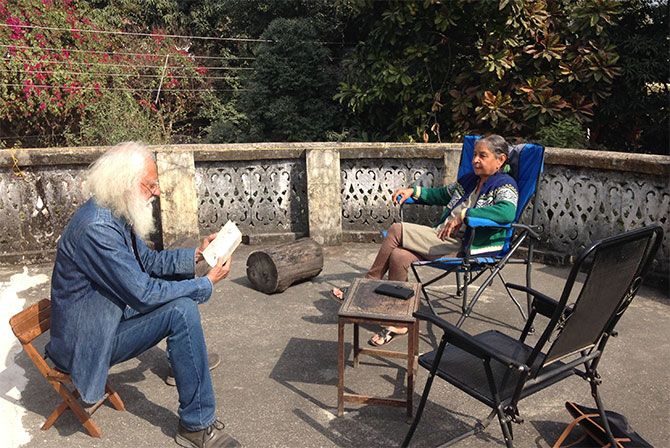
The author of five volumes of poetry, two translations and the editor of several acclaimed anthologies on Indian literature, Professor Mehrotra retired from Allahabad University's department of English after 45 years, and has spent most of the year in Dehradun since 2012.
"I prefer this to Allahabad. Allahabad is flat; the landscape doesn't change for miles, it is hot. Doon is much prettier because of the hills," he says, squinting his eyes at the overhead sun.
"Urban India is one the ugliest sights in the world. I can't imagine too many places where one would want to live. You eventually end up staying where you have a house, either left to you or built by you. Ideally, one would have liked to live in Bombay."
He had once edited an anthology on Allahabad, Last Bungalow, 'a memorial to a now forgotten city whose rise was as meteoric as its fall.'
It was while living in his uncle's bungalow on 20 Hastings Road in Allahabad as a college student that he was exposed to a world of books and wrote his first poems.
He captured those years as an adolescent in the autobiographical essay Partial Recall in the first edition of Civil Lines, the literary journal published by the late Ravi Dayal, the doyen of Indian publishing.
'I wondered then if some of us can ever leave the places we've grown up in,' he wrote about being engulfed by memories of Allahabad on his first morning as a writing fellow in America.
In an interview to the Mint newspaper, he had mentioned that his hair and beard sometimes drew calls of 'Bin Laden, Bin Laden' on the streets of Allahabad. I ask if he continues to encounters such rudeness and he dismisses it casually.
"It's a very East Uttar Pradesh trait, where people are used to saying something if you look a little different in a place which is half urban and half rural."
Then with a laugh, he adds that his beard is as long as it is now because it is tedious to go to a barber and it isn't easy to find another after his barber in Allahabad died.
In spite of being a poet on the faculty of Allahabad University, Professor Mehrotra never had a poetry reading in his 45 years there.
"Unlike the West we don't have readings in our universities. Our universities are not universities in the real sense. There are no Indian universities in the top 200, there may be six in China or one in Taiwan. How can it be that you have been an independent country for 70 odd years and not have even one in the list?"
After his education in Allahabad and then Bombay, he says he first encountered a university when he went to the University of Iowa in 1971 as a visiting writer at the International Writing programme, where many fine Indian writers including poet Adil Jussawalla, novelist Nirmal Verma, poets Jayanta Mahapatra and Dilip Chitre subsequently traveled to.
By then he had already fulfilled his wish of being published in London before turning 20 and had edited three magazines. The first one being damn you, the back cover of which mentioned the price as -- 'Anything commensurate with your dignity -- and ours.'
"The first thing you realised that you were at a university was when you went to the library and asked what time do you close and they said at 2 in the morning. Then it struck me that the place I am coming from and this place are two different institutions which couldn't be called by the same name," he says.
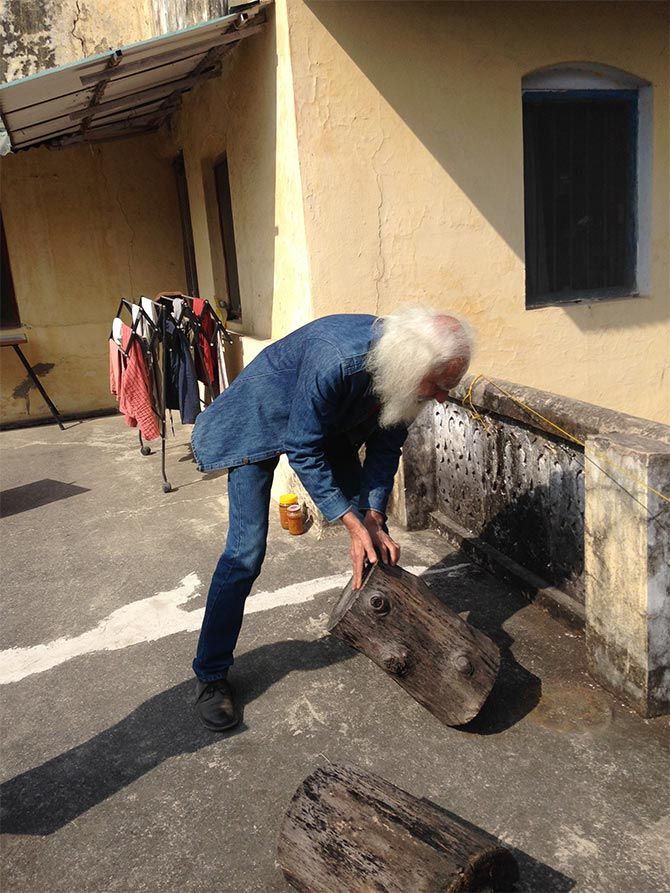
The first Indian nominated to the acclaimed post of professor of poetry at Oxford in 2009, where he was defeated by Ruth Padel (who subsequently resigned) -- Mehrotra feels Indian universities were basically founded to create clerks for the British. They are not places for research and do not contribute to the sum of knowledge.
Appalled at their academic and overall deterioration, he pulls an example out of Allahabad university where journalist Siddharth Varadarajan was called 'anti-national' and stopped from addressing students by the Akhil Bharatiya Vidhyarthi Parishad.
"There is a re-definition of what is national and what is anti-national and there, of course, the BJP is to be blamed."
"Universities are places where ideas go back and forth, no idea can be anti-national. It is just an idea. How can talking to a group of students in a debate or addressing them, be anti-national? As a matter of fact, to not allow people to talk or listen is the biggest act of anti-nationalism."
The content of what he says is powerful, but he speaks with a measured cadence, drawn perhaps from the discipline of a poet's voice. Birds chirp in the background and stray passersby on the road peer over the low boundary wall as I record him on a phone.
I am carrying his translations of Kabir's poetry, Songs of Kabir. We discuss how the bard respected by both Muslims and Hindus wrote verse that was unorthodox and rebellious. The book has a preface by Chicago University Professor Wendy Doniger, whose book The Hindus was withdrawn and pulped by Penguin India after an organisation called Shiksha Bachao Andolan found it insulting.
"Religion at the end of the day is something that man has constructed. It is a nice enough idea, but people can have different ideas at different times and can change religion at will," he says, adding that there are things he doesn't understand and religion is one of them.
"In today's time Kabir wouldn't have been allowed to open his mouth. I am absolutely certain of that," he says, looking at the book which he would later sign resting it on the petite bonnet of his Nano.
"He's very forthright and writes against the Hindus and the Muslims. Had there been any Christians around, he would have written against them as much. He attacked religion in any of its established forms -- whether a temple or mosque or religious site or city or a ritual or holy book. You can't think of anyone writing this today and getting away."
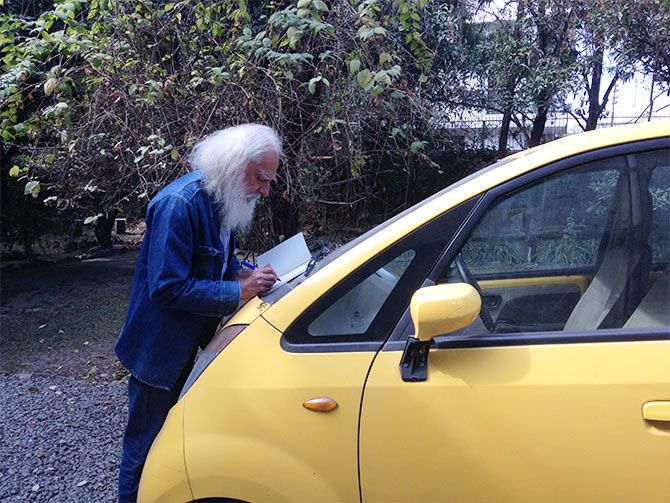
The India of the 1960s and 1970s when Professor Mehrotra started out as a poet was a very different place. It was a time where writers were not aware of any constraints or taboos.
He recounts memories of bringing out a poetry magazine with a cover that would be absolutely unthinkable in present times. It was before the time of desk top printing and he remembers selling it outside the Jehangir Art Gallery in the Bombay of then.
"Some people bought it, others looked at it and moved on. I am sure there were no Hindus around or if there were, they were in hiding somewhere. Thank god for that," he laughs.
"It was just a different nation. Things couldn't have been better for a young writer or painter. This idea of having constraints put on expression didn't even strike us."
He feels what troubles writers today is the fear that anyone can file a case in any remote corner of the country leaving them defenceless. "Then you are left to yourself, running around for the rest of your life fighting the case. What does one do, and it's not just the BJP, the Congress was equally bad."
Having lived through the Emergency when he wrote one poem and generally maintained a low profile, he is surprised that people have forgotten that dark time when Indira Gandhi suspended citizens' freedoms and imposed a brute clampdown on free speech.
"It was probably the scariest two years of one's life, but mercifully it ended very quickly too."
While debates continue to rage in the country about intolerance, comparisons with the Emergency and the constraints on writers, he says people are not being picked up and chucked into prison as it was done in the Emergency, but these are scary times too in a different way.
"You may agree with them or not, but artists have returned their awards. The rot probably lies somewhere in the Sahitya Akademi, which should be made into a bastion where writers can freely express, think and talk. Why couldn't they have done something significant when a writer like M M Kalburgi, a hugely important figure in Kannada literature, was killed?"
"This is the lumpenisation of politics that the police can stand by and watch without doing anything. There are enough horrors being committed in this country every day; freedom of expression is one small part of it. Artistic freedom is alright, but people have lived in Soviet regimes and continued to write and say things."
"Not many people are talking about the economic disparity -- what with 1% of the country's population owning 50% of its wealth. So where are we? This income disparity is a far more urgent issue than this debate about intolerance and freedom of expression."
Scathing about corrupt politicians and every party's own definition of Indian culture, he gives the example of second century erotic love poems about female sexuality which he translated from Prakrit in The Absent Traveller.
"What some semi-educated neta thinks as Indian values becomes Indian values. These politicians should be asked if these Prakrit poems are a part of our culture or not."
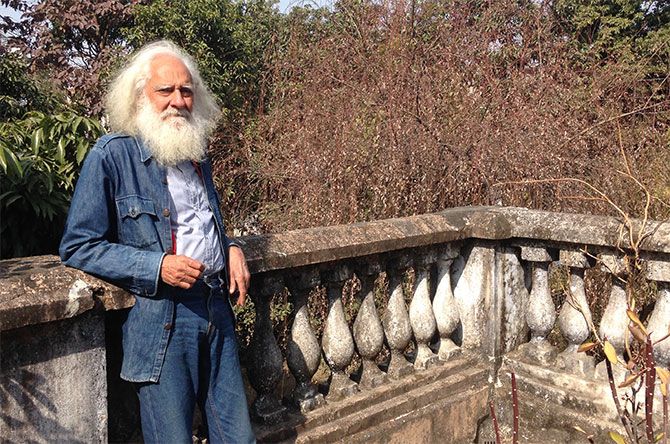
We had had this conversation a week before the nation was gripped by another round of 'who is a patriot; who is a traitor' battle after the police arrested students from the Jawaharlal University for alleged anti-India sloganeering.
Journalists and students were beaten up on two consecutive days by lawyers under the watchful eyes of the Delhi police. Kanhaiya Kumar, the JNU student leader booked for sedition for slogans he says he did not raise, was assaulted in court and sent to Tihar jail. As the controversy raged, the government made flying the flag compulsory in all central universities to instill nationalism.
"Human beings haven't always lived in nation States. To be very honest, I don't feel like an Indian at all. I don't know what an Indian is."
Words that could possibly land him in controversy in these baffling 'prove your nationalism' infused times and I ask him what is it that he feels like.
"As someone who lives in Dehradun. I feel a sense of belonging to a house -- and as far as literature goes, it doesn't belong to a country, but to everyone."
He then invites me into the house whose "every pit and slope" he knows "like the back of his hand." He gives me a walk through the old yellow tiled floor, past the old Baby Belling oven that he and his wife still use.
The terrace has pickle bottles in the sun and logs of wood that serve as stools. I spot a tree in the compound that I haven't seen before and Professor Mehrotra brings out a book of trees -- telling me its English and Hindi names.
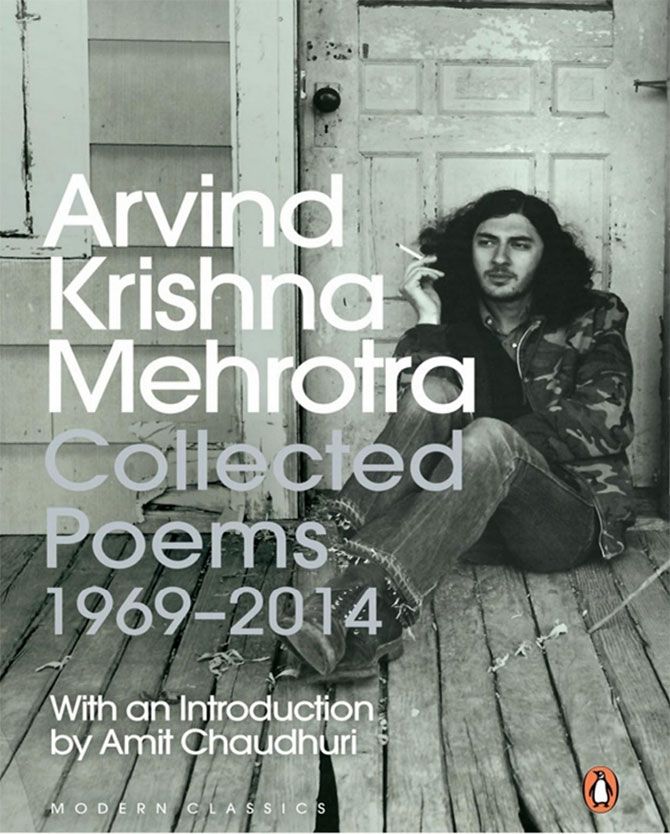
Writer Amit Chaudhuri once said that in the staid world of Indian poetry in English, Arvind Krishna Mehrotra appeared to be what is today called 'cool.' Not only in his poems, the poet's personal style reflects a natural 'coolness' too. (Just take a look at the cover photograph on his latest book and you'll get the drift.) He mostly wears jeans and only has a few clothes that are not denim.
Being a poet is ploughing a lonely furrow, but Professor Mehrotra feels there was a community of like-minded people which to some extent still exists. Earlier, they would read each other's work by post, now they do it over e-mail.
He does not inhabit Facebook or Twitter and is totally unaffected by Twitter wars. Neither does he take it seriously.
His latest book came out two years ago and was a collection of poems from 1969 to 2014 including translations of Bengali, Gujarati, Hindi and Prakrit. He lectures in universities abroad; reads authors whose works he is familiar with and enjoys the literary festivals he attends, but is bemused at the invasion of film stars.
He also feels that just as writers in England have started asking for a fee for an appearance, literary festivals organisers in India should also think about this. "They have advertisers and at the end of the day someone is making lots of money. But that's a separate issue -- one actually goes because you meet readers and it's nice to meet someone who is carrying your book."
Does he feel the liberal space is shrinking?
"I've never felt my freedom of expression has been affected," he says with a lazy cool. "At least, not yet."








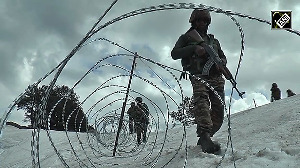


 © 2025
© 2025